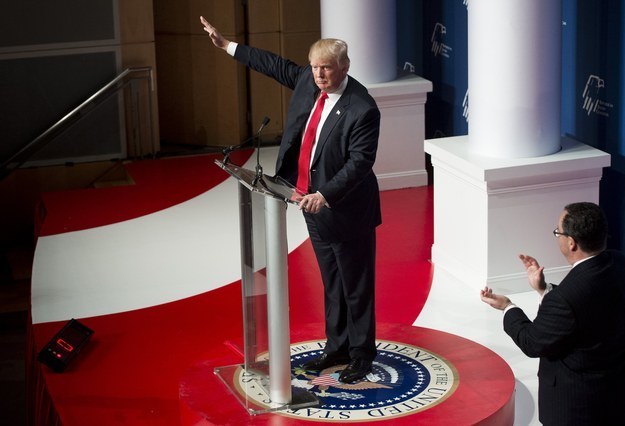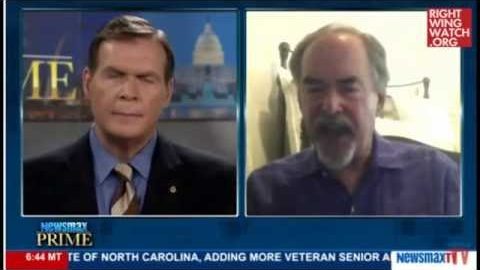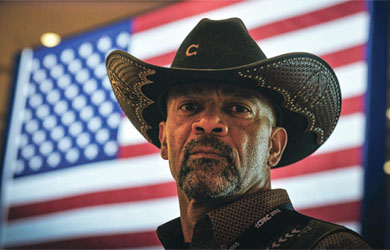Donald Trump’s decision this week to change decades of American policy toward Jerusalem by telling the State Department to being preparing to move the U.S. embassy there—a move Trump made over the objections of American allies, many of his own senior advisers, and Christian leaders in Jerusalem—is seen by many as a serious blow to the prospects for a negotiated peace between Israel and Palestinians. That doesn’t bother Trump’s Religious Right boosters, who pushed hard for and celebrated the policy change, because many of them reject a two-state solution and argue that any land-for-peace deal would violate God’s will.
Trump’s announcement drew criticism from around the world, and an expression of “deep worry” from Pope Francis, but American Religious Right leaders were ecstatic.
Robert Jeffress praised Trump, saying Jerusalem is the place Jesus “will set foot again on earth at his second coming.” Most importantly, he added, “God gave Jerusalem—and the rest of the Holy Land—to the Jewish people.”
The Family Research Council’s Tony Perkins said, “America’s foreign policy, as it pertains to Israel, is coming into alignment with biblical truth—Jerusalem is the eternal and indivisible capital of the Jewish state.” Ralph Reed praised Trump for “finally recognizing the reality that Jerusalem is the eternal, indivisible capital of Israel, the homeland of the Jewish people.” Anti-Muslim activist Pamela Geller said that Trump’s speech has made him “a historical figure of monumental proportion.”
Anti-BDS activist and filmmaker Laurie Cardoza-Moore, reportedly considering a run for Congress from Tennessee, contributed a column to Haaretz welcoming “Trump’s obedience to God’s word on Jerusalem.” “We as a Judeo-Christian nation have a responsibility to uphold the word of God” she had said earlier this month, urging Trump to act. Cardoza-Moore told Gordon Klingenschmitt that people often ask her where the United States is in the End Times, and she always tells them, “Look at the English spelling of the word Jerusalem. What are the three letters in the center of that word? U.S.A. … That is our prophetic place to be.”
Conservative white evangelical leaders, Trump’s most die-hard political base, have been pushing Trump hard to make this move and fulfill one of the campaign promises he made to get their support. Robert Jeffress, one of Trump’s earliest and most ardent evangelical backers, says, “The faith community has talked to the administration for months and months about the need to recognize Jerusalem as the capital of Israel.” Back in May, 60 Religious Right leaders released a letter urging Trump to move the embassy. In a press release at the time, Liberty Counsel’s Mat Staver declared, “Refusal to recognize Jerusalem is anti-Semitic.” Evangelicals didn’t complain too much when Trump passed on a chance to make the move in June because Trump made it clear that it was just a question of timing. But they continued to push for the move, as CBN’s David Brody did in a November interview with Vice President Mike Pence.
The Republican Party’s 2016 platform recognized Jerusalem as “the eternal and indivisible capital of the Jewish state” and called for the U.S. embassy to be moved there, something former campaign adviser Frank Amedia, now heading the Trump-backing “prophetic” network POTUS Shield, takes credit for.
Conservative evangelicals’ alliance with Israel’s right wing stems from a mix of scriptural interpretation, End Times prophecy, and geopolitics. When Israel took east Jerusalem in 1967 in the Six Days War, some Christians saw it as a fulfillment of prophecy and a sign of the End Times. Trump making his announcement in 2017 fit some Christian Zionists’ theory about prophetic events happening in 50-year cycles. This week, megachurch pastor and televangelist Jentezen Franklin said Trump’s announcement caused “a significant spiritual shift in the universe.”
Theologian Diana Butler Bass noted this week that many conservative evangelicals view this as a step toward Jews regaining control of the Temple mount, which they believe is necessary to spark the End Times. “For certain evangelicals, this is the climax of history.”
Jerusalem plays a key role in various versions of End Times theology. End Times author Rabbi Jonathan Cahn told Jim Bakker earlier this year that “Jerusalem is the center of biblical prophecy, everything is centering on it, that’s the end game, that’s the final goal—Jerusalem.” According to Cahn, “the Enemy knows the prophecies, he knows that when the Jewish people come back to the city Jerusalem, Messiah is on his way.”
“For some apocalyptic Christians,” researchers Chip Berlet and Nikhil Aziz have written, “the return of Jesus requires that Jews return to Israel (the ingathering or Aliyah), and rebuild the third Temple of Solomon on the hilltop Jews call the Temple Mount and Muslims call the Noble Sanctuary.” That contested hilltop is where Solomon’s temple once stood and where the Al-Sakhrah mosque, also known as the Dome of the Rock and one of Islam’s holiest shrines, is now located.
Pastor Mike Bickle, who helped organize the prayer rally that served as the unofficial launching pad for Rick Perry’s 2012 presidential campaign, is unequivocal, reports journalist Sarah Posner: “Jews must accept Jesus in order to accomplish God’s will that Jesus return to Jerusalem to rule the world from his throne on the Temple Mount.”
In practice, this theology means unquestioning opposition to any peace deal that includes a two-state solution. In 2006 Pat Robertson said that then-Prime Minister Ariel Sharon’s stroke, and the assassination of Prime Minister Yitzhak Rabin a decade earlier, were divine punishment for “dividing God’s land.” Just a few years ago, Robertson warned that God would punish the U.S. with natural disasters for any role in brokering a two-state solution. “If the United States pressures Israel to try to give up half of Jerusalem, God himself is going to come against this nation,” he told “700 Club” viewers. “Watch it.”
Many Religious Right leaders avoid talking about End Times theology when it comes to Israel and Jews, citing instead Bible verses such as Genesis 12:3, in which God tells Abraham, “I will bless them that bless thee, and curse him that curseth thee” (King James Version) and Numbers 24:9 “Blessed is he who blesses you, and cursed is he who curses you” (New King James Version).
Over the past decade in particular, Religious Right political gatherings frequently included Israeli flags, the blowing of shofars, and harsh denunciations of the Obama administration for supposedly having betrayed Israel. Religious Right leaders and allied politicians who have warned that God would send natural disasters and otherwise punish the U.S. for insufficiently supporting Israel or pressuring it to give up land in a peace deal include Liberty Counsel’s Mat Staver, “historian” and political operative David Barton and Texas Republican Rep. Louie Gohmert.
During the presidential campaign, some of Trump’s boosters declared that he was anointed by God, like the biblical Persian King Cyrus, who had freed Jews in his kingdom to return to Jerusalem. Likud Knesset member Yehuda Glick, who came to D.C. for Trump’s inauguration, which he called a “miracle,” said that if Trump moved the embassy, he would be “the latter-day Cyrus!” At a POTUS Shield gathering in March, a speaker suggested that if Trump fully embraced Israel, he could be famous for thousands of years just like Cyrus. And this week, after the policy change, Christian Zionist leader John Hagee returned to that theme, saying that Trump “will be remembered for thousands of years.”
Which brings us back to Trump’s political reason for making this announcement. The news has been pretty rough for the Trump administration lately. So why not toss another favor to his most loyal supporters and guarantee another wave of adoring coverage in conservative Christian media?








